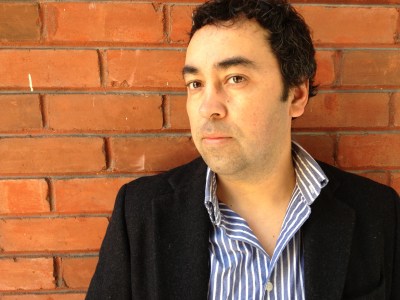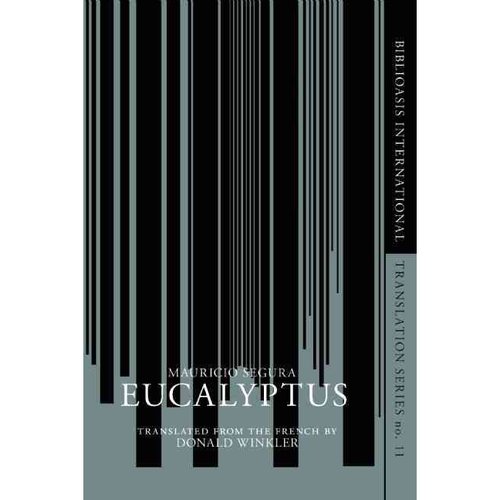Eucalyptus
Mauricio Segura, translated from the French by Donald Winkler
Biblioasis
150 pages, $15.95
ISBN 978-1-927428-37-5
In Mauricio Segura’s third novel, Eucalyptus, a middle-aged man returns to his homeland for his father’s funeral. This, in and of itself, does not make for a unique narrative: countless books, films, and songs have forged similar paths. But what’s arresting about Segura’s vision of this well-worn trope is that he undermines the expected—the revelation of past discretions, the outsider element of “the arrival” after time away—to remark on far greater themes of identity and place. As the slender volume shuttles along with breathtaking execution, eventually taking the form of an existential whodunit, one gleans that Segura isn’t quite interested in “you can’t go home again” platitudes. Rather, he finds fascination in more oblique questions: What is home? Who truly belongs to a parcel of land? And it is these queries that make Eucalyptus an adventurous, hypnotic read.
Alberto Ventura, the novel’s protagonist, is a character not unlike Segura: a Chilean writer who, as a child, migrated to Canada with his family after the 1973 coup-d’état, avoiding the long and violent Pinochet régime. As the narrative opens, Alberto and his young son, Marco, travel from Montreal to Temuco in southern Chile to bury Alberto’s father, the bombastic Roberto, a former political force and current farmer of eucalyptus trees, whose passing comes as an unexpected shock. Over several whirlwind days, Alberto—who remained in Canada after his parents and brother returned to Chile in 1990—is greeted by family and friends and is educated on his father’s shadowy final years: his murder of a young indigenous employee, his love affair with the daughter of an indigenous chief, his separation from those he once loved, his flashbacks to his brief time in prison during the coup. And as Roberto’s history unravels, through declarations both remorseful and bitter, distraught and frustrated, Alberto questions the nature of the man’s passing. Though theoretically killed by an untreated internal hemorrhage, after Alberto discovers a long, puzzling scar on Roberto’s body—“like a snake, zigzagging from waist to chest” (63)—he is convinced that treachery is afoot.
Armed with nothing but his own convictions (“Why waste your time looking into the death of a man who spent his whole life humiliating you?” his uncle Pedro asks at one point [108]), Alberto strikes out to cull information on his father, and as he ping-pongs from homes to police stations to Roberto’s abandoned compound, Segura’s writing adopts strong cinematic elements that spark a narrative rhythm. Here, recollections of characters seamlessly segue, à la a film dissolve, into representative scenes: we hear Roberto’s business partner recollect a moment, for example, only to then submerge into that moment, seeing the world as Roberto sees it, hearing his voice as he speaks. These transitions occur regularly, one or two per chapter, and create a strong structure for Alberto to explore. They are also quietly understated, luring the reader and resulting in a ghostlike journey: passing through bodies, into minds, and then back again. And as Alberto assembles these memories, he is forced to decide which version of his father is genuine. Is he the brute? The egomaniac? The quiet hero? Does it matter?
Thematically, Segura patterns Eucalyptus with constant nods to the idea of invasion and to the fragility of the place one calls home. These themes provide not only additional narrative rhythm, but they also elevate the story, convincing the attentive reader that learning the cause of Roberto’s death is far less important than the exploration of what we all consider ownership. The argument is introduced on page one. Alberto, driving into southern Chile, passes over a bridge:
That’s it, he thought, I’m here. He lowered the window to savour the elusive, vaguely clinical odour of the eucalyptus bordering the Pan-American Highway, and told himself that even his knowledge of the southern flora, he owed to his father. (1)
Not only does Segura deliver Alberto, the stranger, to Chile in these opening lines, but he also offers here the first taste of the eucalyptus, a non-native tree. Farmed on large plantations by Roberto, the eucalyptus peppers the remainder of the manuscript and becomes an analogy for invasiveness and destruction as the novel progresses. “This tree, with its phenomenal growth and undeniable qualities, has…done irreparable damage in some parts of the region,” Alberto is told (130), yet these charges also pervade the thoughts of those Alberto encounters: to some, Roberto has destroyed; to the indigenous Mapuche, Alberto’s entire family is part of the problem. Relationships between Roberto and the Mapuche fluctuate wildly. And while Alberto himself feels misplaced throughout Eucalyptus, paranoid of his foreignness, of his own impact, he recalls his own family lineage, the ancestors who arrived in Chile after a long journey from Andalusia. The Ventura name, like the eucalyptus tree, settled in this country for reasons of prosperity.
And yet, towering over all of Segura’s characters is the Llaima Volcano, the true possessor of Chile. An omnipresent hulk ready to wipe the slate clean, Segura employs Llaima to, again, continue the thread of place and invasion: the volcano threatens to erupt and swallow the region, rendering moot all of the questions provoked by Alberto’s quest. Llaima even taunts Alberto at one point, as Segura writes:
And so Alberto feasted his eyes, as his father had so often done, on the dramatic glow of the sunset, and when he raised them he saw (God in heaven, was he hallucinating?) Lliama emitting a delicate wisp of grey smoke in the form of a question mark. (112)
In this moment, it is as if the gods are looking down on Alberto with not a beacon of hope, but with a shrug. And conceivably that’s the ultimate goal of Segura’s Eucalyptus, for while the case of Roberto’s peculiar death, stuffed with contradictions and unusual characters, spryly marches forward, there is a certain sense, by novel’s end, that the real mystery to be solved skews closer to the experiential: why we end up in the lives we live.
——————————————————
 Benjamin Woodard lives in Connecticut. His recent fiction has appeared in decomP magazinE, Cleaver Magazine, and Numéro Cinq. His reviews and interviews have been featured in Numéro Cinq, Publishers Weekly, Rain Taxi Review of Books, and other fine publications. He is a member of the National Book Critics Circle. You can find him at benjaminjwoodard.com and on Twitter.
Benjamin Woodard lives in Connecticut. His recent fiction has appeared in decomP magazinE, Cleaver Magazine, and Numéro Cinq. His reviews and interviews have been featured in Numéro Cinq, Publishers Weekly, Rain Taxi Review of Books, and other fine publications. He is a member of the National Book Critics Circle. You can find him at benjaminjwoodard.com and on Twitter.

